

15 years ago, Congress kept Mickey Mouse out of the public domain. Will they do it again? For most of history, a great character or story or song has passed from its original creator into the public domain.
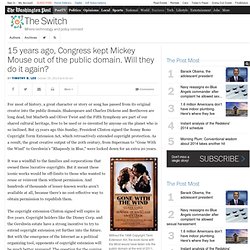
Shakespeare and Charles Dickens and Beethoven are long dead, but Macbeth and Oliver Twist and the Fifth Symphony are part of our shared cultural heritage, free to be used or re-invented by anyone on the planet who is so inclined. But 15 years ago this Sunday, President Clinton signed the Sonny Bono Copyright Term Extension Act, which retroactively extended copyright protection. Obama’s Patent Actions Will Harm U.S. Tech Industry. Yesterday, the Obama administration rolled out a sweeping set of executive actions and legislative recommendations that are supposed to “protect innovators from frivolous litigation” and improve America’s patent system in support of the Leahy-Smith America Invents Act the President signed into law in 2011.

The White House Fact Sheet. How the Patent Wars Are Hurting High-Tech. Patents are as American as mom and apple pie.

Maybe more so. Mom and apple pie aren't mentioned in the Constitution. Patents are such a fundamental part of American economic culture that the Founding Fathers saw fit to address them in the Constitution. But in the software industry, patents may be doing more harm than good -- stifling innovation, hijacking the bottom line, and siphoning shareholder value. 200_France_Biancini_Auriol_Paillacar.pdf.
Should Authorities Decrypt VPNs and Tor – or Ban Them Altogether? There are many legitimate uses for technology such as VPNs and Tor but of course there are those who use them for criminal and objectionable practices.

As Russia prepares an attempt to ban Tor completely, police in Sweden now want to be able to gain access to encrypted communications in cases of serious abuse. “How Should Artists Get Paid?” Isn’t a Question, it’s an Insult. Throughout the debate on sharing culture and knowledge in violation of the copyright monopoly, one question keeps popping up.
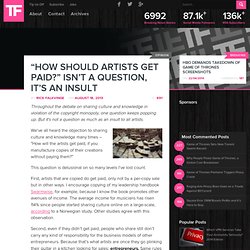
But it's not a question as much as an insult to all artists. We’ve all heard the objection to sharing culture and knowledge many times – “How will the artists get paid, if you manufacture copies of their creations without paying them?” This question is delusional on so many levels I’ve lost count. First, artists that are copied do get paid, only not by a per-copy sale but in other ways. I encourage copying of my leadership handbook Swarmwise, for example, because I know the book promotes other avenues of income.
Second, even if they didn’t get paid, people who share still don’t carry any kind of responsibility for the business models of other entrepreneurs. Third, we don’t live in a planned economy. Pirate Bay Releases ‘Pirate Browser’ to Thwart Censorship. The Pirate Bay is taking a stand against the increased censorship efforts it faces in several European countries.
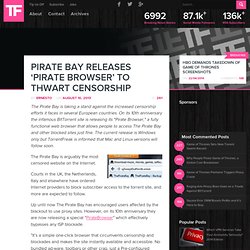
On its 10th anniversary the infamous BitTorrent site is releasing its "Pirate Browser," a fully functional web browser that allows people to access The Pirate Bay and other blocked sites just fine. The current release is Windows only but TorrentFreak is informed that Mac and Linux versions will follow soon. The Pirate Bay is arguably the most censored website on the Internet. Courts in the UK, the Netherlands, Italy and elsewhere have ordered Internet providers to block subscriber access to the torrent site, and more are expected to follow. A Tipping Point Against The Copyright Monopoly Regime Is A Lot Closer Than You Think. When I founded the Swedish Pirate Party and decided to change the political landscape of the copyright monopoly, I frequently told reporters that the plan was to change Sweden, Europe, and the world - in that order.

They usually backed away wondering whether I was serious, so I laid out the plan for them. The key to changing the world’s copyright monopoly regime lies in Europe and the European Union. The reason for that is that the United States is completely dependent on a number of Industrial Protectionism (IP) schemes since the failure of its industrial capacity in the mid-1970s, having moved ahead from that failure with disguising lopsided rent-seeking schemes as “free trade agreements”.
The first of these was the WTO, the body created to oversee the TRIPs agreement. There have been many more since. Externally, the United States puts significant unilateral pressure on any country that doesn’t submit to these agreements, up to and including trade sanctions. About The Author. The Copyright Rule We Need to Repeal If We Want to Preserve Our Cultural Heritage - Benj Edwards. The anti-circumvention section of the Digital Millennium Copyright Act threatens to make archivists criminals if they try to preserve our society's artifacts for future generations.
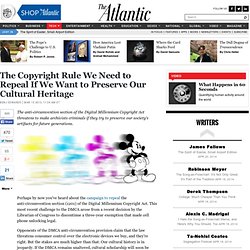
Perhaps by now you've heard about the campaign to repeal the anti-circumvention section (1201) of the Digital Millennium Copyright Act. ALEC makes public hundreds of “model” bills. It’s been public knowledge for a number of years that the American Legislative Exchange Council is responsible for writing model legislation for major industries and then pushing them, through Republican lawmakers, into statehouses nationwide.
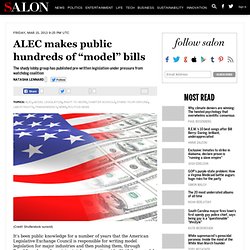
Until these model bills pop up on legislative agendas, however, little is known about the group’s legislation penning. On Friday, following a two-year campaign by watchdog groups, ALEC published hundreds of its model bills online. The coalition of organizations pushing for greater transparency included the Center for Media and Democracy, ColorOfChange, Common Cause, Greenpeace, People for the American Way, Progress Now and a variety of labor organizations. The full list of model bills is available here. It includes template bills pertaining to charter schools, climate (mis)education, union-busting right to work bills, workplace drug testing laws and more.